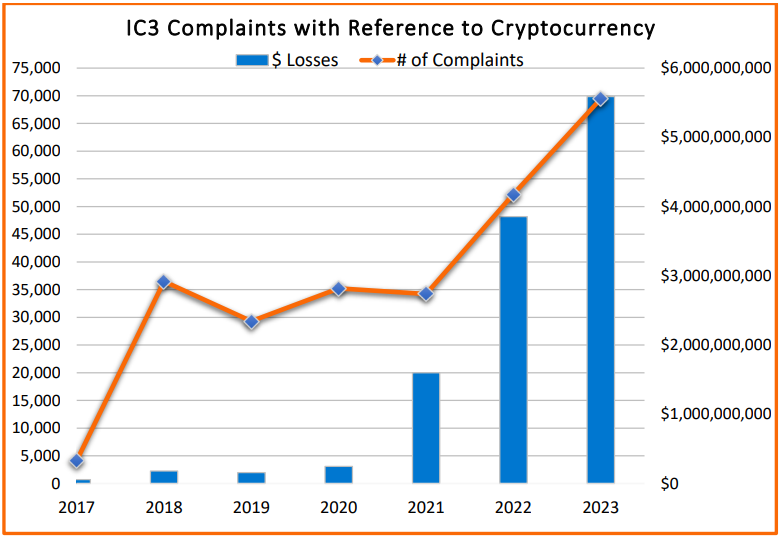FBI: Reported cryptocurrency losses reached $5.6 billion in 2023
The FBI says that 2023 was a record year for cryptocurrency fraud, with total losses exceeding $5.6 billion, based on nearly 70,000 reports received through the Internet Crime Complaint Center (IC3).
This marks a 45% increase in losses compared to the previous year, driven primarily by investment fraud, which accounted for 71% of the total cryptocurrency losses. Other types of fraud contributing to the statistics include tech support scams, call center fraud, and government impersonation.
The vast majority of the reported losses ($4.8 billion) were incurred by U.S. citizens, followed by Cayman Islands ($196M), Mexico ($127M), Canada ($72M), the UK ($59M), India ($44M), and Australia ($25M).
In the U.S., California is the state that suffered the highest damages, recording losses of $1,155,000,000 followed by Texas ($412M), Florida ($390M), and the New York ($317M).
FBI's report highlights various fraud trends that dominated 2023. In what concerns investment fraud, the main trends revolved around variations of dating apps and professional networking platforms leading to "pig butchering" sites.
There are also liquidity mining scams where victims are promised high returns for staking their assets in a liquidity pool.
Criminals in 2023 also created fake gaming applications claiming to be based on blockchain technologies. They promised players cryptocurrency rewards to trick them into connecting their wallets.
Fraudsters also used cryptocurrency recovery scams where they target victims of previous scams, offering fake recovery services for stolen cryptocurrency. These schemes often require upfront payments for retrieving lost funds.
How to protect from cryptocurrency fraud
The IC3 report explains that cybercriminals target cryptocurrency because of its decentralized nature, the existence of mechanisms that can help obscure the money trace, and the victim's inability to revert fraudulent transactions.
Cryptocurrency holders can protect themselves from fraud by following these recommendations:
- Be skeptical when met with "too good to be true" investment promises
- Verify the legitimacy of investment platforms before committing any funds.
- Ask your investment advisor to meet in person and treat refusal as a red flag.
- Use separate cryptocurrency wallets for gaming and investments.
- Periodically check wallet permissions using a trusted third-party token allowance checker tool, and revoke access where necessary.
- Avoid liquidity mining pools that do not follow cryptocurrency market fluctuations.
- Be wary of private recovery companies claiming ability to seize stolen cryptocurrency and requiring upfront payments.
- Independently verify caller identities by calling companies back using publicly available contact information.



Comments